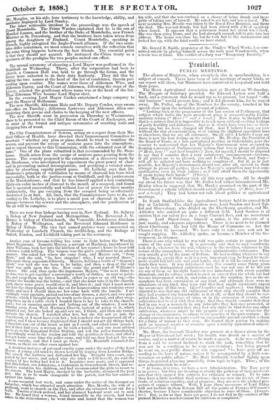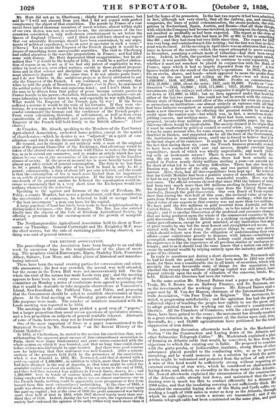Vrauiurial.
PUBLIC MEETINGS.
The silence of Ministers, when everybody else is speechmaking, is a subject of remark. There have been of late meetings of many kinds, as our report will show, but Ministers have contrived to keep aloof and hold their peace.
The Herts Agricultural Association met at Hertford on Wednesday. The Marquis of Salisbury presided. Sir Edward Lytton sent half a buck, and a statement that he would try to be present, but feared " offi- cial business" would prevent him ; and it did prevent him, for he stayed away. Mr. Puller, one of the Members for the county, touched in his speech close upon the forbidden ground of politics. " Looking back at the programme of the last session of Parliament, that subject which holds the most prominent place is unquestionably Parlia- mentary reform (" Hear ! " and a laugh.) Now it may be thought that that is a subject that it is impossible to touch upon without exciting feelings of party hostility and difference. And so it would have been two or three years ago, but we have changed all that. And I believe I may say now without the risk of contradiction, or of raising the slightest opposition here or elsewhere, that we are all reformers. On all sides I believe I may say there is now the best feeling on the subject. Mr. Henley, the President of the Board of Trade, at a late agricultural meeting in OxIrdshire, gave the country to understand that her Majesty's Government were occupied in framing a measure of Parliamentary reform that was to please all parties. (" Hear, hear " and loud laughter.) Now, for myself, I should be disposed to say that I consider that a very satisfactory announcement—because, if all parties are to be pleased, you and I—Whig, Radical, and Tory— will all be satisfied and 'have nothing to complain of. But if, as is just possible, her Majesty's Government should slot, after all, succeed in their attempt to please all parties, then her Majesty's opposition may find some gratification even in their failure ; as it will afford them the opportunity of again trying their hands." (Cheers.) The Marquis of Salisbury took all this very quietly. All he should say about the future was that Mr. Puller had rather misunderstood Mr. Henley when he supposed that Mr. Henley promised on the part of the Government a reform bill that should satisfy all parties. (" Hear, hear !" and a laugh.) They had better not talk about politics at agricultural meetings.
In South Staffordshire the Agricultural Society held its annual field day at Lichfield. The chief speakers were Lord Sandon and Lord Tal- bot and Shrewsbury, who dilated on the Cherbourg question, and Mr. Adderley who entered on quite a different field. Lord Sandell is of opinion that our safety lies in a large Channel fleet, and no monstrous army. Lord Shrewsbury, himself a sailor, is the advocate of a just, manly, and adequate expenditure. There is no need to be alarmed about Cherbourg. He had told the House of Commons so. Let the Channel fleet be increased. We have only- to take care and not be caught napping. Mr. Adderley spoke, as became a Member of the Go- vernment, in enigmas. There is one crop which he was told was quite certain to appear in the course of the next session. It is generally said that we may confidently look for it, whatever be the soil, whatever be the weather, whatever be the nature of the atmosphere, whoever be, the administrative cultivators. The crop usually goes by the name of Reform. Ile had nothing whatever to say respecting it, except that as it is a very important crop he hoped its treat- ment would fall into safe and good hands, and if it did he cared not whose hands they were. It was introduced into this country some thirty years ago by very distinguished cultivators—and he was not sure if he did not see one of them on his right hand—it was introduced with every possible stimulant, and its culture carried to such an extent that the whole soil had become impregnated with it, and calm as was the weather, free as the at- mosphere was from convulsions of any kind, and although there were no stimulants of any kind, they were told that they might confidently expect the recurrence of this crop. (Loud laughter and applause.) One thing he objected to was that any old cultivators of that crop should consider that they had acquired any tenant-right in it at all, or that they should be sur- prised that, in the passage of time, or in the succession of events, other cultivators had to deal with that crop ; that they should consider that they had in any way a monopoly in any principles they had once promoted, or that they should consider that they had any right to bind down any other cultivators, whatever might be the progress of science, or whatever the change of circumstances, to adhere to the practice of the past century. Ile should conceive that no party could on ally possible ground establish a claim for a fixity of tenure in that crop. He begged their pardon for making such an unusual number of remarks upon a strictly agricultural subject. (Continued laughter.) Mr. Hutt, the borough Member was present at a dinner given by the Mayor of Gateshead last week ; his health WAS drunk as a matter of course, and as a matter of course he made a speech. As he was suffering from a cold he seemed inclined to shirk the task, remarking that he was not in a condition to be very entertaining ; but being pressed he went on, as a public dinner is not supposed "to have gone off ac- cording to the laws of nature unless it be accompanied by a little con- versation on public affairs." Mr. Hutt forthwith touched lightly upon things in general glancing gracefully from topic to topic. Thus; of the new administration he said- " At home, it is true, we have a new Administration. The Tory party is in power; but they are treading so evenly the pathway of their predeces- sors that they suggest few subjects for criticism or remark. To be sure they have a little modified their notions ; they are now the friends of free- trade, of religious equality, and of progress ; they are now the pledged pro- jectors of organic reform. Well, I hope these successors of Lord Eldon will not include in their Reform Bill all the points of Feargus O'Connor's charter, because I have considerable objection to some of them. (Laugh- ter.) But, as far as they have yet gone, I do not find in the conduct of the present Ministers much occasion for criticism or complaint."
Mr. Hutt did not go to Cherbourg; chiefly for personal reasons; but said he " I will not conceal from you that I did not regard with perfect complacency the object of that expedition. The parade by France of a vast naval force and of immense resources of naval warfare, almost within sight of our own shores, was not, it seemed to me, the circumstances of the two
countries considered, a very well-chosen entertainment to set before the Queen of England (Cheers); and I think vou will have shared my regret that our admirable Sovereign should have been constrained, by any argu- ments of political expediency, to be an actor or spectator in such a scene." (Cheers.) Yet no doubt the Emperor of the French thought it would be a means of smoothing down unreasonable asperities. The visit to Cherbourg had called attention to the war-like preparations in France; and had filled some with dismay. Mr. Hutt deprecated blind exaggerations ; but he ad- mitted that "it would be the height of folly, it would be a perfect abdica- tion of reason in us, to act as if we had any patent of superiority in war, either by lend or sea, over other nations, except in those prudent prepara- tions and in that science and discipline on which all warlike superiority must ultimately depend. At the same time I do not admire panic fears ; and I do not believe in the ambitious projects so freely attributed to our ally the Emperor of the French. I am convinced, on the contrary, that when he told the pople of Bourdeaux, 'Empire c'est la Paix, he announced the settled policy of his firm and sagacious mind ; and I don't think he is the man to be driven from that policy of peace because certain parties in France hostile to his power—Socialists, Orleanists, and Legitimists—are al- ways labouring to involve him in war, and especially in war with England. What would the Emperor of the French gain by war ? If his forces suffered a reverse it would be the ruin of his fortunes. If they were vic- torious, do you suppose it would be for his interest to divide with their suc- cessful commander the homage and the confidence of the French people ? From every calculation, therefore, of self-interest, as well as from every consideration of an enlightened and generous policy, I believe that the Emperor of the French will hold firmly to the It; ritish alliance." (Loud sheers.)
At Croydon, Mr. Alcock, speaking to the Members of the East Surrey Agricultural Association, eschewed home politics, except in the matter of church-rates—which he desires to see " adjusted " in a spirit of con- ciliation—and dwelt on the favourable treaty with China.
He trusted, and he thought it not unlikely with a man of the original ideas of the present Chancellor of the Exchequer, that advantage would be taken of the altered state of our relations with China to reduce the duty on tea, so as to extend our commerce, and to render an article which has now almost become one of; the necessaries of life more accessible to the humbler classes of society. At the present moment tea is more heavily taxed than almost any other article of general consumption. The duty is no less than Is. 9d. a pound, though the price of tea itself in bond is only ls. 4d. a pound ; consequently, a duty of about 140 per cent is levied, and the result is that the consumption of tea is much more limited than its importance as an article of general consumption requires. If the duty were reduced to one-fourth of its present amount he believed the consumption would in- crease so enormously that in a very short time the Exchequer would lose nothing whatever by the reduction.
Speaking to the squires and farmers of the vale of Evesham, Mr. Foley, a county Member, but never a protectionist, said that, considering the uncertainties of commerce, he believed to hold or occupy land is "the best investment" a man can have for his capital. A large purchase of land has lately been made in that neighbourhood by a distinguished foreigner,—the Duo d'Aumale. The Due has also entered kindly into the objects of the Vale of Evesham Agricultural Society, by offering a premium for the encouragement of the growth of mangold- wurtzel.
The Northamptonshire Agricultural Association held its show at Tow- eester on Thursday. General Cartwright and Mr. linightley M.P. were the chief orators, but the rule of excluding politics being observed, no- thing was said of general interest.



































 Previous page
Previous page